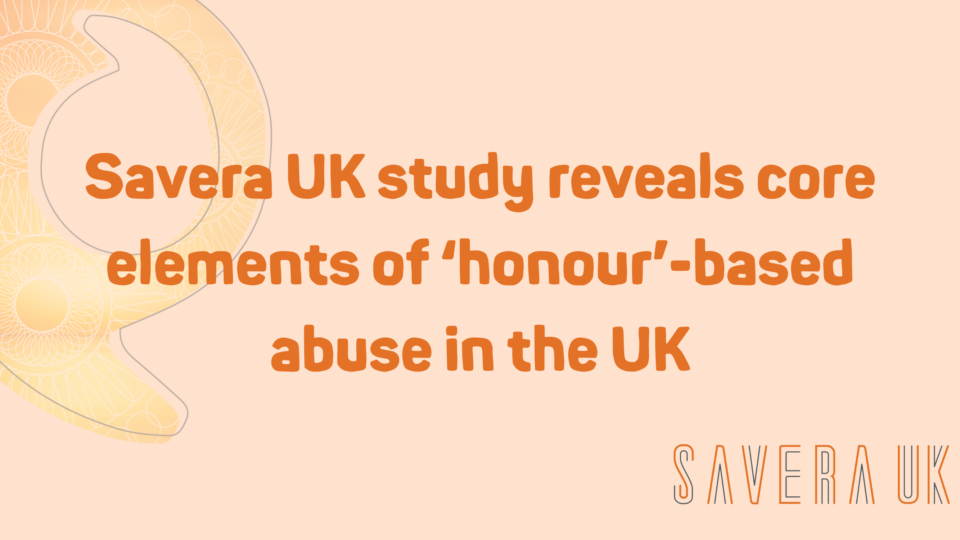Emotional/psychological abuse and coercive control has been identified as the most common characteristic of ‘honour’-based abuse (HBA) and harmful practices, in new research conducted by the University of Liverpool and Savera UK.
The research ‘Honour’-based abuse: A descriptive study of survivor, perpetrator, and abuse characteristics[1], published last month in the Journal of Investigative Psychology and Offender Profiling, examines survivor, perpetrator, and abuse characteristics in anonymised cases of HBA and harmful practices such as forced marriage and female genital mutilation (FGM), provided by Savera UK.
Much information on HBA currently available is based on self-reporting and exploration of individuals’ lived experience, meaning baseline data to help better understand the issues is limited. The study was instigated by Savera UK to fill this gap, working in partnership with the University of Liverpool and using the charity’s own data to identify base rates of survivor, perpetrator, and abuse characteristics.
Of 66 abuse characteristics identified by researchers, the study highlighted that a case of HBA would usually present with around 14 of these characteristics.
Emotional/psychological abuse and coercive control, specific family cultural traditions, gender-based socialisation and physical violence were found to be present in 90% of coded cases, suggesting these to be core elements of HBA in the UK.
Abuse characteristics associated with survivors that are usually highly linked to cases of HBA, such as exploration of identity or sexuality, were present less frequently than expected. For example, premarital sex, which features highly in literature about HBA based on self-reported data and survivor stories, was only present in 20 cases.
This study was able to explore broader and subtler forms of abuse, as the data reflected not only survivor experiences, but also the professional judgement of Savera UK support staff specialising in this field.
It also highlighted overlaps between HBA and domestic abuse, as well as clear separating markers, such as the presence of multiple perpetrators, specific family cultural traditions and community influencing the perpetrator(s).
In its examination of survivor characteristics, the study found that almost half (41.4%) held UK citizenship, 27.8% asylum seekers and 18.1% had limited or indefinite leave to remain. The majority were Muslim (74.8%) but Christianity was the second most prevalent religion among survivors with (14.2%).
Almost two thirds of cases had multiple perpetrators (63.1%) and all involved male perpetrators, with additional female perpetrators in 36.4% of cases. However, no cases involved a sole female perpetrators.
Speaking of Savera UK’s first-ever research paper, Afrah Qassim, CEO and Founder of the charity, said: “The lack of data around HBA and harmful practices has always been a challenge for organisations like Savera UK that support survivors and those at risk.
“When we established the charity in 2010 many local authorities told us there was no need for our service because there was no data indicating that HBA was an issue. Since then we have worked to uncover these hidden practices and demand for our service has increased by more than 1,000 per cent between 2016 and 2022.”
“This baseline data is vitally important and a starting point to allow better understanding of the prevalence of different abuse characteristics and improved insight into HBA in the UK. This information will help frontline workers like police officers and social workers to more easily identify and support survivors and those at risk, develop specialist HBA risk assessment tools, improve prevention strategies and inform where further research is urgently needed to help tackle these issues.”
Professor Louise Almond, from the University of Liverpool, said: “This base rate study highlights the wide range of abuse suffered by ‘honour’-based abuse survivors. What was most surprising was the low prevalence of characteristics that have been previously linked with ‘honour’ based abuse in Western media. Our study reflects a potentially different “reality” for these survivors, one which is more nuanced than maybe the public and/or statutory agencies realise”
To read the full paper visit: https://onlinelibrary.wiley.com/doi/10.1002/jip.1602
[1] K.Ridley, L.Almond, N.Bafouni, A.Qassim (2022) ‘Honour’-based abuse: A descriptive study of survivor, perpetrator, and abuse characteristics, Journal of Investigative Psychology and Offender Profiling https://onlinelibrary.wiley.com/doi/10.1002/jip.1602

